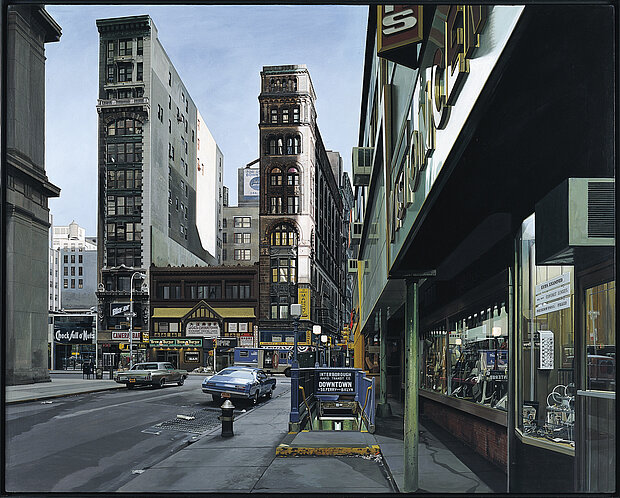
Estes, Richard
Downtown
1978

© mumok
| Object description | Oil on canvas |
|---|---|
| Object category | painting |
| Material |
Painting layer:
oil paint
Support:
canvas
|
| Technique |
Object:
oil paintings
|
| Dimensions |
Weight:
weight: 42 kg
Objekt:
height: 122 cm
Object:
width: 152 cm,
depth: 4 cm
Frame:
height: 130,8 cm,
width: 161,2 cm,
depth: 7,6 cm
|
| Year of acquisition | 1991 |
| Inventory number | ÖL-Stg 238/0 |
| Creditline | mumok - Museum moderner Kunst Stiftung Ludwig Wien, Leihgabe der Österreichischen Ludwig-Stiftung |
| Rights reference | Estes, Richard |
| Further information about the person | Estes, Richard [GND] |
| Literature |
Der Flaneur. vom Impressionismus bis zur Gegenwart HEINER ALTMEPPEN.Landschaften in Bewegung Hyper Real Responding to Art. Form, Content, and Context La creazione ansiosa. da Picasso a Bacon Museum moderner Kunst Stiftung Ludwig Wien Picturing America English G 2000 Realismus.Das Abenteuer der Wirklichkeit Cool and the Cold : Malerei aus dem USA und der UdSSR 1960 - 1990 Sammlung Ludwig |
Like other painters associated with photo-realistic painting, Estes works from photographs, yet his urban landscapes do much more than merely offer a seemingly precise record of reality. The composition of "Downtown" is vertically divided in two. While on the right hand side of the painting we see a strongly foreshortened storefront, the left half shows a deserted street which, flanked by two parked cars, runs back towards the facade of some building. In the right half of the painting, the stairs of a New York subway entrance can be made out, explaining the picture’s title. The seemingly over-precise perspective and the almost hallucinatory clarity of Estes’ painting are brought about in fact by various spatial manipulations. This hyper-visibility, where what is distant and what is near is brought into equally sharp focus – a feat the naked eye is incapable of – is achieved through the fusion of countless snapshots of one and the same setting. Estes draws from a wealth of such pictures with different focal points, light reflexes and angles, using them like sketches from which the final painting is put together. In contrast to many other photo-realists, Estes transfers the photographic originals onto the support medium without resorting to mechanical means. Since he does not use a spray-gun, the individual brushstrokes can still be made out in the finished work.
© mumok – museum moderner kunst stiftung ludwig wien